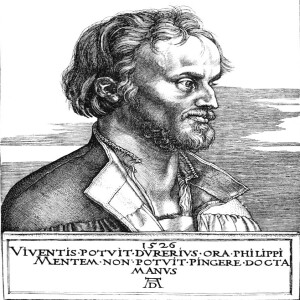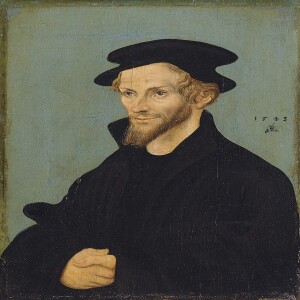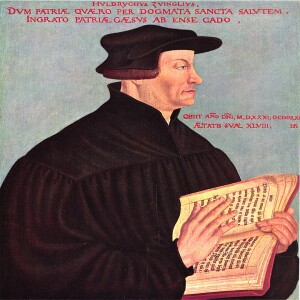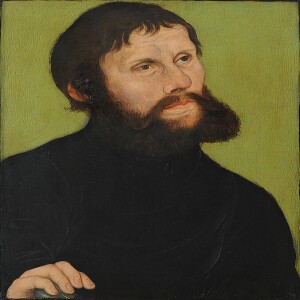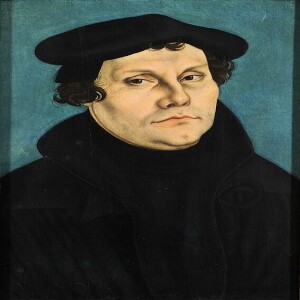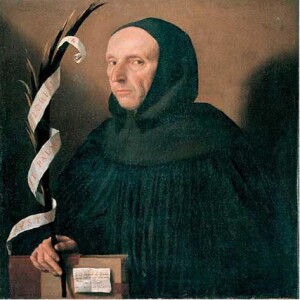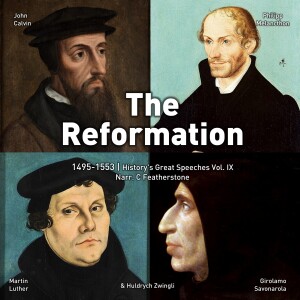1) The Roman Pontiff claims for himself that by divine right he is above all bishops and pastors in all Christendom.2) Secondly, he adds also that by divine right he has both swords, i.e., the authority also of bestowing kingdoms.3) And thirdly, he says to believe this is necessary for salvation. And for these reasons the Roman bishop calls himself (and boasts that he is) the vicar of Christ on earth.4) These three articles we hold to be false, godless, tyrannical, and pernicious to the Church.5) Now, in order that our proof may be understood, we shall first define what they call being above all by divine right. For they mean that he is universal, or, as they say, ecumenical bishop, i.e., from whom all bishops and pastors throughout the entire world ought to seek ordination and confirmation, who is to have the right of electing, ordaining, confirming, deposing all bishops. 6) Besides this, he arrogates to himself the authority to make laws concerning acts of worship, concerning changing the Sacraments concerning doctrine, and wishes his articles, his decrees, his laws to be considered equal to the divine laws, i.e., he holds that by the papal laws the consciences of men are so bound that those who neglect them, even without public offense, sin mortally. And what he adds is still more horrible, namely, that it is necessary to believe all these things in order to be saved.7) In the first place, therefore, let us show from the Gospel that the Roman bishop is not by divine right above other bishops and pastors.8) I. Luke 22, 25. Christ expressly prohibits lordship among the apostles. For this was the very question, namely, that when Christ spake of His passion, they were disputing who should be at the head, and as it were the vicar of the absent Christ. There Christ reproves this error of the apostles and teaches that there shall not be lordship or superiority among them, but that the apostles should be sent forth as equals to the common ministry of the Gospel. Accordingly, He says: The kings of the Gentiles exercise lordship over them, and they that exercise authority upon them are called benefactors, but ye shall not be so; but he that is greatest among you, let him be as the younger; and he that is chief, as he that doth serve. The antithesis here shows that lordship is disapproved.II. Matt. 18, 2. The same is taught by the parable when Christ in the same dispute concerning the kingdom places a little child in the midst, signifying that among ministers there is not to be sovereignty, just as a child neither takes nor seeks sovereignty for himself.9) III. John 20, 21. Christ sends forth His disciples on an equality, without any distinction, when He says: As My Father hath sent Me, even so send I you. He says that He sends them individually in the same manner as He Himself was sent; hence He grants to no one a prerogative or lordship above the rest.10) IV. Gal. 2, 7 St. Paul manifestly affirms that he was neither ordained nor confirmed by Peter, nor does he acknowledge Peter to be one from whom confirmation should be sought. And he expressly contends concerning this point that his call does not depend upon the authority of Peter. But he ought to have acknowledged Peter as a superior if Peter was superior by divine right. Paul accordingly says that he had at once preached the Gospel without consulting Peter. Also: Of those who seemed to be somewhat (whatsoever they were, it maketh no matter to me; God accepteth no man’s person). And: They who seemed to be somewhat in conference added nothing to me. Since Paul, then, clearly testifies that he did not even wish to seek for the confirmation of Peter even when he had come to him, he teaches that the authority of the ministry depends upon the Word of God, and that Peter was not superior to the other apostles, and that it was not from this one individual Peter that ordination or confirmation was to be sought.11) V. In 1 Cor. 3, 6, Paul makes ministers equal, and teaches that the Church is above the ministers. Hence superiority or lordship over the Church or the rest of the ministers is not ascribed to Peter. For he says thus: All things are yours, whether Paul, or Apollos, or Cephas, i.e., let neither the other ministers nor Peter assume for themselves lordship or superiority over the Church; let them not burden the Church with traditions; let not the authority of any avail more than the Word; let not the authority of Cephas be opposed to the authority of the other apostles, as they reasoned at that time: “Cephas, who is an apostle of higher rank, observes this; therefore, both Paul and the rest ought to observe this.” Paul removes this pretext from Peter, and denies (Not so, says Paul, and makes Peter doff his little hat, namely, the claim) that his authority is to be preferred to the rest or to the Church.12) VI. The Council of Nice resolved that the bishop of Alexandria should administer the churches in the East, and the Roman bishop the suburban, i.e., those which were in the Roman provinces in the West. From this start by a human law, i.e. the resolution of the Council, the authority of the Roman bishop first arose. If the Roman bishop already had the superiority by divine law, it would not have been lawful for the Council to take any right from him and transfer it to the bishop of Alexandria; nay, all the bishops of the East ought perpetually to have sought ordination and confirmation from the bishop of Rome.13) VII. Again the Council of Nice determined that bishops should be elected by their own churches, in the presence of some neighboring bishop or of several. 14) The same was observed for a long time, not only in the East, but also in the West and in the Latin churches, as Cyprian and Augustine testify. For Cyprian says in his fourth letter to Cornelius: Accordingly, as regards the divine observance and apostolic practice, you must diligently keep and practice what is also observed among us and in almost all the provinces, that for celebrating ordination properly, whatsoever bishops of the same province live nearest should come together with the people for whom a pastor is being appointed, and the bishop should be chosen in the presence of the people, who most fully know the life of each one, which we also have seen done among us at the ordination of our colleague Sabinus, that by the suffrage of the entire brotherhood, and by the judgment of the bishops who had assembled in their presence, the episcopate was conferred and hands laid on him.15) Cyprian calls this custom a divine tradition and an apostolic observance, and affirms that it is observed in almost all the provinces.Since, therefore, neither ordination nor confirmation was sought from a bishop of Rome in the greater part of the world in the Latin and Greek churches, it is sufficiently apparent that the churches did not then accord superiority and domination to the bishop of Rome.16) Such superiority is impossible. For it is impossible for one bishop to be the overseer of the churches of the whole world, or for churches situated in the most distant lands to seek ordination from one. For it is manifest that the kingdom of Christ is scattered throughout the whole world; and to-day there are many churches in the East which do not seek ordination or confirmation from the Roman bishop. Therefore, since such superiority is impossible, and the churches in the greater part of the world have not acknowledged it, it is sufficiently apparent that it was not instituted by Christ, and does not spring from divine law.17) VIII. Many ancient synods have been proclaimed and held in which the bishop of Rome did not preside; as that of Nice and most others. This, too, testifies that the Church did not then acknowledge the primacy or superiority of the bishop of Rome.18) IX. Jerome says: If the question is concerning authority, the world is greater than the city. Wherever there has been a bishop, whether at Rome, or Eugubium, or Constantinople, or Rhegium, or Alexandria, he is of the same dignity and priesthood.19) X. Gregory, writing to the patriarch at Alexandria, forbids that he be called universal bishop. And in the Records he says that in the Council of Chalcedon the primacy was offered to the bishop of Rome, but was not accepted.20) XI. Lastly, how can the Pope be over the entire Church by divine right when the Church has the election, and the custom gradually prevailed that bishops of Rome were confirmed by the emperors? 21) Also, when for a long time there had been contests concerning the primacy between the bishops of Rome and Constantinople, the Emperor Phocas finally determined that the primacy should be assigned to the bishop of Rome. But if the ancient Church had acknowledged the primacy of the Roman Pontiff, this contention could not have occurred, neither would there have been need of the decree of the emperor.22) But they cite against us certain passages, namely, Matt. 16, 18: Thou art Peter, and upon this rock I will build My Church; also: I will give unto thee the keys; also John 21, 15: Feed My sheep, and some others. But since this entire controversy has been fully and accurately treated elsewhere in the books of our theologians, and everything cannot be reviewed in this place, we refer to those writings, and wish them to be regarded as repeated. Yet we shall reply briefly concerning the interpretation.23) In all these passages Peter is the representative of the entire assembly of apostles, as appears from the text itself. For Christ asks not Peter alone, but says: Whom do ye say that I am? And what is here said to Peter alone in the singular number: I will give unto thee the keys; and whatsoever thou shalt bind, etc., is elsewhere expressed to their entire number, in the plural Matt. 18, 18: Whatsoever ye shall bind, etc. And in John 20, 23: Whosesoever sins ye remit, etc. These words testify that the keys are given alike to all the apostles and that all the apostles are alike sent forth to preach.24) In addition to this, it is necessary to acknowledge that the keys belong not to the person of one particular man, but to the Church, as many most clear and firm arguments testify. For Christ, speaking concerning the keys adds, Matt. 18, 19: If two or three of you shall agree on earth, etc. Therefore he grants the keys principally and immediately to the Church, just as also for this reason the Church has principally the right of calling. Therefore it is necessary that in these passages Peter is the representative of the entire assembly of the apostles, and for this reason they do not accord to Peter any prerogative or superiority, or lordship.25) However, as to the declaration: Upon this rock I will build My Church, certainly the Church has not been built upon the authority of man, but upon the ministry of the confession which Peter made, in which he proclaims that Jesus is the Christ, the Son of God. He accordingly addresses him as a minister: Upon this rock, i.e., upon this ministry. 26) Furthermore, the ministry of the New Testament is not bound to places and persons as the Levitical ministry, but it is dispersed throughout the whole world, and is there where God gives His gifts, apostles, prophets, pastors, teachers; neither does this ministry avail on account of the authority of any person, but on account of the Word given by Christ. 27) Nor does the person of a teacher add anything to this word and office; it matters not who is preaching and teaching it; if there are hearts who receive and cling to it, to them it is done as they hear and believe. And in this way, not as referring to the person of Peter, most of the holy Fathers, as Origen, Cyprian, Augustine, 28) Hilary, and Bede, interpret this passage: Upon this rock. Chrysostom says thus: “Upon this rock,” not upon Peter. For He built His Church not upon man, but upon the faith of Peter. But what was his faith? “Thou art the Christ, the Son of the living God.” And Hilary says: To Peter the Father revealed that he should say, “Thou art the Son of the living God.” 29) Therefore the building of the Church is upon this rock of confession; this faith is the foundation of the Church.30) And as to that which is said John 21, 15: Feed My sheep, and, Lovest thou Me more than these? it does not as yet follow hence that a peculiar superiority was given Peter. He bids him “feed,” i.e., teach the Word, or rule the Church with the Word, which Peter has in common with the other apostles.31) The second article is still clearer, that Christ gave to the apostles only spiritual power, i.e., the command to teach the Gospel to announce the forgiveness of sins, to administer the Sacraments, to excommunicate the godless without bodily force, and that He did not give the power of the sword, or the right to establish, occupy or confer kingdoms of the world. For Christ says, Matt. 28, 19. 20: Go ye, teaching them to observe all things whatsoever I have commanded you; also John 20, 21: As My Father hath sent Me, even so send I you.Now, it is manifest that Christ was not sent to bear the sword or possess a worldly kingdom, as He Himself says, John 18, 36: My kingdom is not of this world. And Paul says, 2 Cor. 1, 24: Not for that we have dominion over your faith; and 2 Cor. 10, 4: The weapons of our warfare are not carnal, etc.32) Accordingly, that Christ in His passion is crowned with thorns and led forth to be derided in royal purple, this signified that in the future, after His spiritual kingdom was despised, i.e., the Gospel was suppressed, another kingdom of a worldly kind would be set up with the pretext of ecclesiastical power. 33) Therefore the Constitution of Boniface VIII and the chapter Omnes, Dist. 22 and similar opinions which contend that the Pope is by divine right the ruler of the kingdoms of the world, are false and godless. 34) From this persuasion horrible darkness has been brought into the Church, and after that also great commotions have arisen in Europe. For the ministry of the Gospel was neglected, the knowledge of faith and the spiritual kingdom became extinct, Christian righteousness was supposed to be that external government which the Pope had established.35) Next, the Popes began to seize upon kingdoms for themselves; they transferred kingdoms, they vexed with unjust excommunications and wars the kings of almost all nations in Europe, but especially the German emperors, sometimes for the purpose of occupying cities of Italy, at other times for the purpose of reducing to subjection the bishops of Germany, and wresting from the emperors the conferring of episcopates. Yea, in the Clementines it is even written: When the empire is vacant, the Pope is the legitimate successor.36) Thus the Pope has not only usurped dominion, contrary to Christ’s command, but has also tyrannically exalted himself above all kings. And in this matter the deed itself is not to be reprehended as much as it is to be detested, that he assigns as a pretext the authority of Christ; that he transfers the keys to a worldly government; that he binds salvation to these godless and execrable opinions, when he says it is necessary to salvation for men to believe that this dominion belongs to him by divine right.37) Since these great errors obscure faith and the kingdom of Christ they are in no way to be concealed. For the result shows that they have been great pests to the Church.38) In the third place, this must be added: Even though the bishop of Rome had the primacy and superiority by divine right nevertheless obedience would not be due those pontiffs who defend godless services, idolatry, and doctrine conflicting with the Gospel. Nay; such pontiffs and such a government ought to be held accursed, as Paul clearly teaches, Gal. 1, 8: Though an angel from heaven preach any other gospel unto you than that which we have preached unto you, let him be accursed. And in Acts 5, 29: We ought to obey God rather than men. Likewise the canons also clearly teach that a heretical Pope is not to be obeyed.The Levitical high priest was the chief priest by divine right, and yet godless high priests were not to be obeyed, as Jeremiah and other prophets dissented from the high priests, the apostles dissented from Caiaphas and did not have to obey them.









